| Return to Doctor Who spin-offs | Return to Doctor Who contents page | Return to site index |
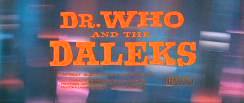
PETER CUSHING
The cinematic Doctor Who
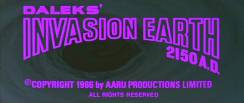
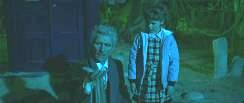
The two Doctor Who cinema movies were produced by Milton Subotsky, and adapted from two of the William Hartnell television stories. The rigours of the TV show's production schedule would never have allowed William Hartnell the necessary time off to film a couple of features - so it was inevitable that the part would be recast. Peter Cushing was a well known and popular film and television actor. His notable performances included Winston Smith in the BBC's highly controversial 1954 adaptation of Orwell's Nineteen Eighty-Four - and more importantly, he was an international star as a result of playing Frankenstein and Van Helsing in the popular Hammer horror films, so he was an ideal choice to portray Doctor Who on the cinema screen. His star status could lend box office appeal in foreign markets where the name Doctor Who was unknown. Perhaps wisely, Cushing chose not to portray the character as a carbon copy of Hartnell. He softened the Doctor, making him an energetic, absent-minded, slightly mischievous but loveable old scientist, full of boyish enthusiasm.
The script did not have time to introduce all the concepts of the tv series, so Doctor Who became an Earth-based inventor who seems to have built a time machine in his back garden. (Most fans will tell you that the movie Doctor is depicted as an Earthman, but in fact this is never stated anywhere in the films. He could just as easily be an alien who is living on Earth - an alternative interpretation of the "exile in the fourth dimension" backstory of the tv series.) There was also more humour injected into the stories, especially with the casting of Roy Castle and Bernard Cribbins as comic relief companions. Subotsky's scripts also cut down the original television versions to less than half their original length - with, it has to be said, no obvious loss of the plot structure - therefore making the stories more gripping and fast-moving, and more easily digestible.
Perhaps because of all these changes, the films are not universally popular with Doctor Who fans. This purist attitude was far more prevalent in the days before anyone had seen the original versions again! With widespread availability of the television episodes, fan opinion of the films seems to have improved considerably. The two films are marvellously entertaining, and have quite superb production values, not only in comparison with the TV series, but when compared to other contemporary British science fiction films as well. Sci-fi movies were usually made as cheap filler material in Britain, so it's gratifying to see that Subotsky was prepared to spend some considerable money to make the Doctor Who films look good. (Off-hand, I can only think of three British sci-fi films of the period that compare visually: Hammer's Quatermass and the Pit and Moon Zero Two, and Gerry Anderson's Doppelgänger.)
Given the nature of the Cushing movies (remakes of original TV stories) it seems impossible to place them directly into the series continuity. But I don't think that's any reason to exclude them. Doctor Who fans can be extremely narrow-minded in their insistence on fitting stories into a defined canon. (I talk more about the validity of apocryphal Doctor Who stories elsewhere.)
The Cushing movies could be seen as stories from an alternative universe where Doctor Who was a human inventor with an interest in sci-fi adventure - he even reads the Eagle. In this context, we might even suppose that the adventures of the Time Lord are all just wild imaginings in this human Doctor's head...
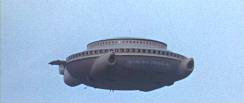
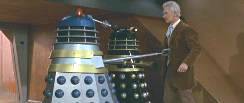
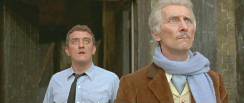
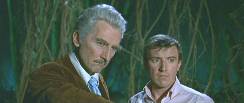
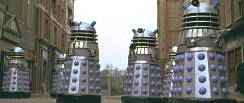
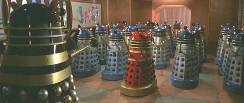
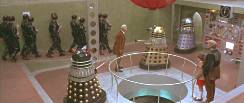
Return to Doctor Who spin-offs